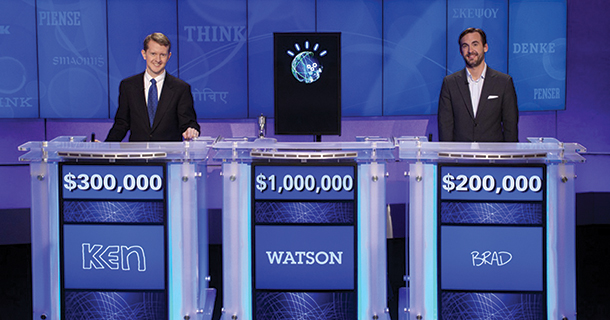
As machine learning continues to grow, we all need to develop new skills in order to differentiate ourselves. But which ones?
It’s long been known that AI and automation/robotics will change markets and workforces. Self-driving cars will force over 3,000 truck drivers to seek new forms of employment, and robotic production lines like Tesla’s will continue to eat away at manufacturing jobs, which are currently at 12 million and falling. But this is just the beginning of the disruption.
As AI improves, which is happening quickly, a much broader set of “thinking” rather than “doing” jobs will be affected. We’re talking about jobs, that, until the last few years, we couldn’t imagine being done without the participation of an actual, trained human being. Jobs like teacher, doctor, financial advisor, stockbroker, marketer, and business consultant.
There are many things that machines can do better than human beings, and we shouldn’t be too proud to admit it. Many skilled jobs follow the same general workflow:
- Gather data
- Analyze the data
- Interpret the results
- Determine a recommended course of action
- Implement the course of action
We can look at any number of occupations to see that this holds true. Doctors perform tests, analyze the results, interpret the results to make a diagnosis, plan a course of treatment, and then work with the patient to make this treatment plan a reality.
Financial advisers gather and analyze data about their clients and potential investment vehicles, interpret the implications given a variety of factors such as risk tolerance, recommend an investment strategy, and help their clients carry this strategy out over time
Business consultants do much the same, but diagnose and solve business problems.
These highly skilled workers can command high rates because of three capabilities. Their ability to go through the early rote tasks quickly and accurately; their experiences and judgment in determining a course of action; and their savviness for helping clients navigate that course.
AI and machine learning will quickly surpass our abilities on the first two capabilities—and this will shift the skillset required for any worker wishing to stay in these careers as they are transformed by artificial intelligence.
It’s easy to see the role of automated systems in data gathering and analysis. We’ve accepted that machines can do these types of tasks efficiently. However, their potential goes much further. Human beings are limited, and often biased. Doctors will never be able to keep up with every new publication in their areas of expertise. Instead, they must rely on a small number of personal experiences rather than the complete knowledge in their field. Consultants, too, can only experience so many company transformations over their careers. From a narrow set of experiences, they form their preferences, expectations, and insights. Human beings can’t just plug in more servers when we reach our limits processing new information. Instead, we must rely on our own, often biased, preferences, habits, and rules of thumb.
Some people may say that we will never trust machines with important decisions such as the management of our health and money, but this is twentieth century thinking. But a new generation is engaging with smart machines that they trust, and often prefer. Further, it’s hard for anyone to argue with results. IBM’s Watson is already cracking medical cases that stump doctors, and investors are fleeing expensive, actively managed funds for better-performing passive ones. The value of some of our most prized career paths is already being eroded.
Those that want to stay relevant in their professions will need to focus on skills and capabilities that artificial intelligence has trouble replicating—understanding, motivating, and interacting with human beings. A smart machine might be able to diagnose an illness and even recommend treatment better than a doctor. It takes a person, however, to sit with a patient, understand their life situation (finances, family, quality of life, etc.), and help determine what treatment plan is optimal.
Similarly, a smart machine may be able to diagnose complex business problems and recommend actions to improve an organization. A human being, however, is still best suited to jobs like spurring the leadership team to action, avoiding political hot buttons, and identifying savvy individuals to lead change.
It’s these human capabilities that will become more and more prized over the next decade. Skills like persuasion, social understanding, and empathy are going to become differentiators as artificial intelligence and machine learning take over our other tasks. Unfortunately, these human-oriented skills have generally been viewed as second priority in terms of training and education. We’ve all experienced the doctor, financial planner, or consultant who is more focused on his or her reports and data than on our unique situations and desires.
For better or worse, these skills will become essential to anyone who wants to stay relevant in their field as automated systems proliferate. We have three recommendations:
Don’t fight the progress of technology. Machine learning and AI have the ability to improve outcomes and lower cost—so don’t fight the robots. Welcome the change in your industry and work to make it fruitful and complementary.
Examine your own capabilities interacting with, motivating, and assessing people. Recognize your strengths and weaknesses when it comes to emotional intelligence.
Invest in developing your emotional intelligence. The simplest way is to change your mental model about what is important in your role, and begin focusing on how you can better manage, influence, and relate to others. Or, take it a step further by seeking out training and stretch opportunities.
What you have to offer—what you can do better than any smart machine—is relate to the people around you. Begin to nurture and invest in these abilities the same way that you have the more technical parts of your career. If you can be an outstanding motivator, manager, or listener, then you will still have a part to play as technology changes your industry.
Authors: Megan Beck and Barry Libert














